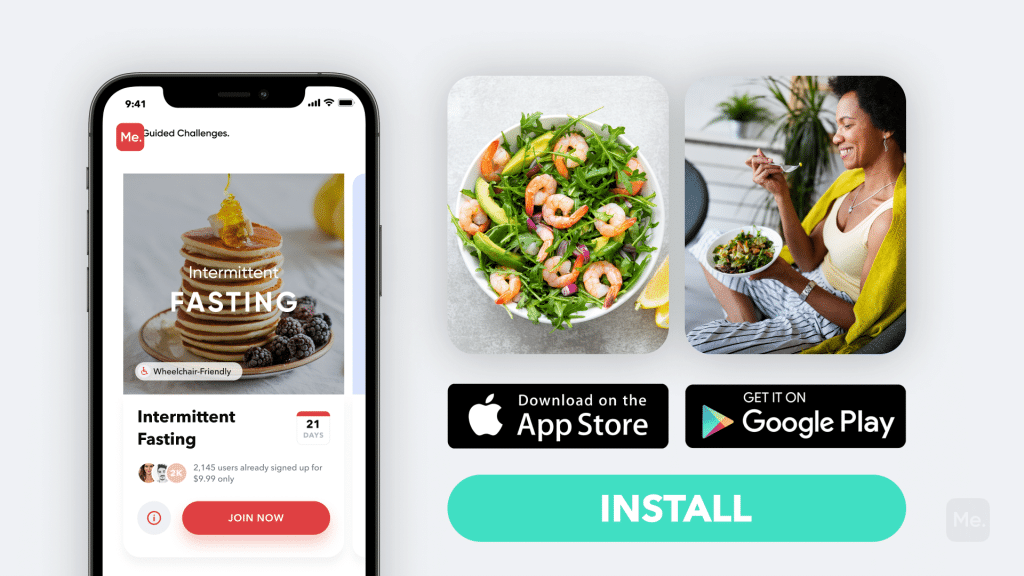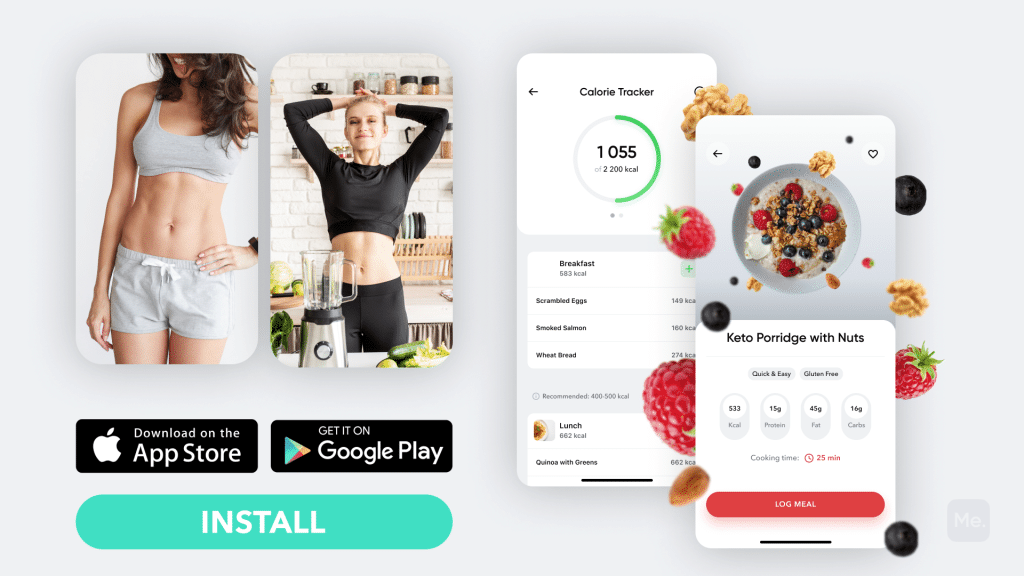Carbohydrates aka carbs have a bad rap these days. Whether it’s Atkins, South Beach or some other low carb diet, carbs are a common target for criticism. On the one hand you have the AND—the Academy of Nutrition and Dietetics—and most of the credible nutrition sources saying that carbohydrates are an essential part of a healthy diet. On the other you have all these individual diets or influencers telling people not to eat them. So who’s right? Both sides have a point. Carbohydrates aren’t inherently bad, and you do need them to function, but some carbs are better than others. Let’s explain why by first explaining what carbs are and what they do in your body.
Get your personalized
meal plan!
What Are Carbs?
Carbohydrates are one of the three macronutrients—the other two being protein and fat. Their main function is to provide energy. Carbs are broken down in the mouth and small intestine into smaller units of sugar called glucose, which is what your body uses for energy.
So carbs have a primary purpose: To provide energy for the body. The problem is that different types of carbs do this in different ways and not all these ways are good for us.
What Are Some Different Types Of Carbs?
You can group carbs as we eat them today into two categories of carbs: unrefined and refined. You can think of them as complex and simple, or unprocessed and processed.
Unrefined Carbohydrates
Unrefined, complex carbs are the ones that nutritionists recommend we eat more of (2). These are whole grains, legumes (beans), vegetables, and fruits. They provide energy the same way all carbs do, but it takes more time to break them down so they provide steady energy over a longer period of time.
Refined Carbohydrates
On the other hand, refined, simple carbs are the ones nutritionists warn against.
Refined carbs go through a process that breaks down their complex structures before they enter our bodies, and then we convert them into pure glucose in a matter of minutes. The problem with this is that it happens very quickly and your body doesn’t have to work at all to break it down because it’s already been partially broken down (6). This typically leads to a quick burst of energy followed by a crash.
So What’s The Problem With Glucose?
All carbs are ultimately broken down into glucose, but the amount and pace makes a difference. Glucose causes your blood sugar levels to increase as it is absorbed into your bloodstream. If you eat more carbs than you can use at one time, your body doesn’t really know what to do with all of it so some of the glucose is converted into fat for storage. Over time, eating too many refined carbs can lead to insulin resistance and obesity (5).
Read More: 1500-Calorie Keto Diet: Cut On Carbs To Shed Some Pounds
Why Refined Carbs Are Bad For You
There are several reasons why you should avoid refined carbs.
They Are Lower In Fiber
Whole grains (unrefined) consist of three parts: the bran, germ and endosperm. The bran and germ are high in fiber which helps keep you full longer and maintain healthy cholesterol levels. Refined carbs only contain the endosperm (which is mostly starch) and this greatly reduces their fiber content (1).
They Contain Less Micronutrients
Micronutrients are the vitamins and minerals your body needs to function at its best. Whole grains (unrefined) contain a high concentration of micronutrients such as folate, thiamine, phosphorus, magnesium and niacin (7). Refined carbs contain negligible amounts of these nutrients because they are removed during the refining process. Sometimes some of them are added back, but it’s still not the same as eating the whole grain.
They Make You Overeat
Since refined carbs are converted to glucose very quickly and don’t have much fiber, you tend to get hungry again faster. As a result, people who eat a lot of refined carbohydrates tend to gain weight or have trouble losing it (4). Meanwhile, foods with complex carbs make you feel full longer because the amount of time it takes for your body to break them down into glucose is greater, and the fiber also creates a feeling of fullness.
They Increase The Risk Of Heart Disease And Type 2 Diabetes
A diet high in refined carbs has been linked to heart disease and diabetes.
Studies have shown that people who eat a lot of these foods are more likely to develop insulin resistance or to be overweight (3). Refined carbs are also associated with higher triglyceride levels. Conversely, research shows that whole grains may help lower the risk of heart disease by lowering LDL (“bad”) cholesterol levels which aids in slowing the buildup of plaque (7).
BetterMe app will provide you with a host of fat-frying fitness routines that’ll scare the extra pounds away and turn your body into a masterpiece! Get your life moving in the right direction with BetterMe!
Refined Carbs List: Avoid These Foods
Here are examples of foods containing refined carbs that you should avoid or limit:
- Sugars – White sugar, brown sugar, high fructose corn syrup, agave syrup, honey etc.
- White Breads – White flour, enriched flour etc.
- Processed Meats – Deli meats, bacon, hot dogs etc.
- Candy Bars – Snickers, Mars bars, M&Ms etc.
- Pastries and Cakes – Doughnuts, cupcakes etc.
- Frozen Foods – Frozen yogurt, ice cream sandwich, frozen pizza etc.
- Junk Foods – Potato chips, pretzels, corn chips etc.
- Processed Sauces and Salad Dressings – Ketchup, barbeque sauce, mayo etc.
Tips For Avoiding Refined Carbs
You can use these tips to cut down on refined carbs and have a healthier diet:
Cook More At Home
The less you eat out, the more control you’ll have over what you eat. Prepare your own meals at home using whole grains (unrefined) whenever possible.
Add Some Whole Grains
Switch up your white rice for brown, go with oatmeal instead of cream of wheat or cream of rice, and try some barley or quinoa in place of the rice. Swap your white bread and white pasta for whole wheat. You can also use whole grains (unrefined) such as wheat berries, brown rice or quinoa in your cooking to add some variety and fiber to your diet.
Learn To Read Labels
You can find refined carbs in the most unlikely places so it’s important to know what you’re looking for. Keep an eye out for these words on your food labels: “enriched flour”, “wheat flour”, “multigrain”, etc. If you don’t see the word “whole,” it’s most likely a refined carb.
Read More: Carbs Before Bed: What Does Science Say?
Avoid Processed Or Packaged Foods
Refined carbs are more abundant in processed foods. By cooking more at home and going for whole, unprocessed foods whenever possible you can avoid refined carbs.
Be Careful When Eating Out
Restaurants use refined carbs for their convenience and because they are cheaper. When you dine out try to stick with restaurants that offer healthier options or ask your server what’s in the dish so you can make an educated choice.
Use Zero Calorie Sweeteners
If you’re a fan of sweet foods and drinks, you can still have them with zero calorie sweeteners such as sucralose. These may be easier options than trying to cut down on sugar but they aren’t necessarily healthier, so you can also go for the occasional treat and avoid overindulging.
Avoid Diet Foods
They may be low in calories but they are also low in nutrients. Plus, some people tend to eat more of these foods than regular ones so you’re better off staying away from them completely.
Betterme will keep you laser-focused on your weight loss journey! Nutrient-packed meal plans, fat-blasting workouts, galvanizing challenges and much more. Try using the app and see for yourself!
How To Identify Hidden Sugars
Manufacturers are required to list the total amount of sugar on a food label but there are different forms of sugar that can be used. Here are a few tips to help you identify and avoid hidden sugars:
Learn Different Names For Sugar
Once you know common names of sugars, you can spot them on food labels. Here are some common ones:
- Corn sweetener
- Corn syrup
- Fructose
- Fruit juice concentrate
- Glucose
- High-fructose corn syrup
- Maltose
- Honey
- Invert sugar
- Lactose
- Dextrose
- Malt syrup
- Molasses
- Raw sugar
- Sucrose
Be Wary Of The Ones Toward The End Of The List
Lots of times these types of sugar are listed near the bottom because they’re in smaller quantities than the first ingredients listed. When a food label lists more than one form of sugar, the first ingredient is the one with the highest quantity.
The Bottom Line
Not all carbs are created equal. Some carbs provide energy slowly while others provide it quickly, leading to fat gain and eventually insulin resistance if they make up a large portion of your diet in the long-term.
Refined carbs in particular are to be limited, as they are quickly converted into glucose, raising your blood sugar levels.
DISCLAIMER:
This article is intended for general informational purposes only and does not serve to address individual circumstances. It is not a substitute for professional advice or help and should not be relied on for making any kind of decision-making. Any action taken as a direct or indirect result of the information in this article is entirely at your own risk and is your sole responsibility.
BetterMe, its content staff, and its medical advisors accept no responsibility for inaccuracies, errors, misstatements, inconsistencies, or omissions and specifically disclaim any liability, loss or risk, personal, professional or otherwise, which may be incurred as a consequence, directly or indirectly, of the use and/or application of any content.
You should always seek the advice of your physician or other qualified health provider with any questions you may have regarding a medical condition or your specific situation. Never disregard professional medical advice or delay seeking it because of BetterMe content. If you suspect or think you may have a medical emergency, call your doctor.
SOURCES:
- Associations of whole-grain, refined-grain, and fruit and vegetable consumption with risks of all-cause mortality and incident coronary artery disease and ischemic stroke: the Atherosclerosis Risk in Communities (ARIC) Study (2003, pubmed.gov)
- Dietary carbohydrates: role of quality and quantity in chronic disease (2018, nih.gov)
- Excessive refined carbohydrates and scarce micronutrients intakes increase inflammatory mediators and insulin resistance in prepubertal and pubertal obese children independently of obesity (2014, pubmed.gov)
- High glycemic index foods, overeating, and obesity (1999, pubmed.gov)
- Refined carbohydrates, phenotypic plasticity and the obesity epidemic (2019, sciencedirect.com)
- Refined Carbs and Sugar: The Diet Saboteurs (2021, helpguide.org)
- Whole Grains (n.d., harvard.edu)












